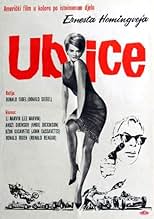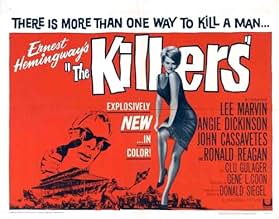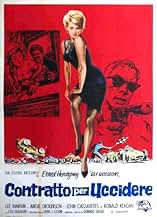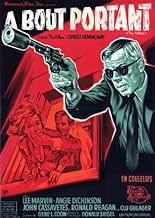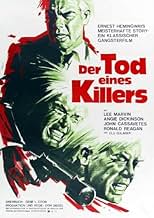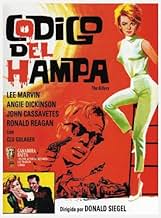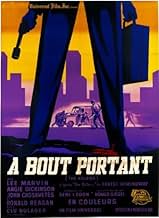AVALIAÇÃO DA IMDb
7,0/10
10 mil
SUA AVALIAÇÃO
Surpreendidos por a vítima não ter tentado fugir deles, dois assassinos profissionais tentam descobrir quem os contratou e por quê.Surpreendidos por a vítima não ter tentado fugir deles, dois assassinos profissionais tentam descobrir quem os contratou e por quê.Surpreendidos por a vítima não ter tentado fugir deles, dois assassinos profissionais tentam descobrir quem os contratou e por quê.
- Direção
- Roteiristas
- Artistas
- Ganhou 1 prêmio BAFTA
- 1 vitória e 1 indicação no total
Irvin Mosley Jr.
- Mail Truck Guard
- (as Irvin Mosley)
- Direção
- Roteiristas
- Elenco e equipe completos
- Produção, bilheteria e muito mais no IMDbPro
Avaliações em destaque
One of Hollywood's greater contract directors, Donald Siegel, brought Hemmingway's short story to TV, but NBC turned it down because, for 1964, it was too damn brutal. Although it pales in comparison to the 1946 original, this cheap (thanks to the gawd-awful production values of Universal in the sixties) remake holds it own.
When button-men Lee Marvin and Clu Gulager show up at a school for the blind to empty their silenced revolvers into former race-car driver John Cassavetes, they don't expect him to just stand there and take it. Marvin, exuding clean-smelling and lean menace and Gulager, a carrot-juice swilling sociopath travel cross-country in their search for Cassavetes' story. They find that the race driver, washed up after a near-fatal crash gains employment with mobster Ronald Reagan (I can just see Ronnie giving Gorbachev the same look at the 1986 summit that he gives Cassavetes when the driver challenges the mobster for control of Reagan's girl, Angie Dickinson). After lots of double-crosses and a fair amount of "why did he or she do that?," Marvin comes calling at Reagan's door.
Lee Marvin was excellent when portraying a killing machine and he holds the movie together. He and Gulager are there to punctuate the sometimes good and sometimes not-so-good flashbacks and they are suave and eerily debonair grim reapers. If anything, they're more interesting than the flashbacks; all good action flicks need good bad guys and Reagan looks too bored with the whole thing. Is it possible that, after seeing him so successful and upbeat for eight years in the White House, a grim and petty Reagan seems anachronistic? Yet, it really is Marvin who makes this movie rise above the cheap production values, the cheesy matte photography, and the canned John(ny) Williams score.
Marvin was about to begin a string of successes that would last into the early seventies. That voice is so distinctive! When he talked, he sounded, as another reviewer once said, "like a dinosaur growling." He is so evil and you can't stop liking him. Although Marvin and Robert DeNiro are completely different actors, they both have the same effect on me when they inhabit the screen--I stop doing everything else and just watch them. Pure charisma. When asked by David Letterman why he was so popular, Lee Marvin simply grinned and, with his index finger extended, growled, "Ratatatat!" Don Siegel would go on to make other tough movies; his style was clean, tough, and with just enough style to leave the audience with a satisfied taste in it's mouth. Under his direction, Clint Eastwood would establish himself as a superstar. One can only imagine how far Marvin would have gotten under the command of the button-man director!
When button-men Lee Marvin and Clu Gulager show up at a school for the blind to empty their silenced revolvers into former race-car driver John Cassavetes, they don't expect him to just stand there and take it. Marvin, exuding clean-smelling and lean menace and Gulager, a carrot-juice swilling sociopath travel cross-country in their search for Cassavetes' story. They find that the race driver, washed up after a near-fatal crash gains employment with mobster Ronald Reagan (I can just see Ronnie giving Gorbachev the same look at the 1986 summit that he gives Cassavetes when the driver challenges the mobster for control of Reagan's girl, Angie Dickinson). After lots of double-crosses and a fair amount of "why did he or she do that?," Marvin comes calling at Reagan's door.
Lee Marvin was excellent when portraying a killing machine and he holds the movie together. He and Gulager are there to punctuate the sometimes good and sometimes not-so-good flashbacks and they are suave and eerily debonair grim reapers. If anything, they're more interesting than the flashbacks; all good action flicks need good bad guys and Reagan looks too bored with the whole thing. Is it possible that, after seeing him so successful and upbeat for eight years in the White House, a grim and petty Reagan seems anachronistic? Yet, it really is Marvin who makes this movie rise above the cheap production values, the cheesy matte photography, and the canned John(ny) Williams score.
Marvin was about to begin a string of successes that would last into the early seventies. That voice is so distinctive! When he talked, he sounded, as another reviewer once said, "like a dinosaur growling." He is so evil and you can't stop liking him. Although Marvin and Robert DeNiro are completely different actors, they both have the same effect on me when they inhabit the screen--I stop doing everything else and just watch them. Pure charisma. When asked by David Letterman why he was so popular, Lee Marvin simply grinned and, with his index finger extended, growled, "Ratatatat!" Don Siegel would go on to make other tough movies; his style was clean, tough, and with just enough style to leave the audience with a satisfied taste in it's mouth. Under his direction, Clint Eastwood would establish himself as a superstar. One can only imagine how far Marvin would have gotten under the command of the button-man director!
I haven't seen Robert Siodmark's 1946 original, but since it's generally accepted to be better than this version; I sure want to see it! Second best, this may be, but that's certainly not to say that this isn't an excellent flick. Lee Marvin steps into the role of a hit-man brilliantly, and his no-nonsense performance really makes the film. He is joined by Clu Gulager as his fellow hit-man and partner into an investigation that comes about through Marvin as he wonders why he was paid so much to kill a former race car driver, who also didn't run away when he had the chance. What follows is a tour de force of gangster pulp fiction as the two hit men pay little visits to the various players in the plot behind the assassination they were contracted to commit. The style of the movie is delicious, and watching these two men stroll around coolly in their expensive suits while interrogating their various victims is a treat indeed. Several modern films, Pulp Fiction most obviously, have taken a lot of influence from this flick and it's always good to know where that influence came from.
The central pairing of Lee Marvin and Clu Gulager is what made the film for me. The way that they populate their scenes is excellent, with one of them doing the talking and the other fiddling around in the background. The way that this is orchestrated gives away a very understated coolness, which the film is always keen to capitalise on. The pair's chemistry is more to do with the style and how they look together than how they interact with each other; and that is right on cue. The Killers also benefits from an excellent support cast, which includes the likes of Ronald Reagan, Angie Dickinson and John Cassavetes. This film can't be considered noir because it's in colour, but this is about as close as you can get to the style without actually being a part of it. The film that it was based on was film noir, and this remake has managed to retain the foundations, even if it has lost the dark picture. On the whole, The Killers is an excellent picture and while what some people say about it being second to the original may be withstanding; I say this is an excellent flick in it's own right.
The central pairing of Lee Marvin and Clu Gulager is what made the film for me. The way that they populate their scenes is excellent, with one of them doing the talking and the other fiddling around in the background. The way that this is orchestrated gives away a very understated coolness, which the film is always keen to capitalise on. The pair's chemistry is more to do with the style and how they look together than how they interact with each other; and that is right on cue. The Killers also benefits from an excellent support cast, which includes the likes of Ronald Reagan, Angie Dickinson and John Cassavetes. This film can't be considered noir because it's in colour, but this is about as close as you can get to the style without actually being a part of it. The film that it was based on was film noir, and this remake has managed to retain the foundations, even if it has lost the dark picture. On the whole, The Killers is an excellent picture and while what some people say about it being second to the original may be withstanding; I say this is an excellent flick in it's own right.
Director Don Siegel's "The Killers" is very loosely based on the Hemingway short story with few similarities. Two killers (Lee Marvin and Clu Gulager)complete an easy hit-for-hire but wonder why their victim, although warned in advance, didn't run away from them. After piecing together some information, they realize that the $25,000 they got for the hit is a drop in the bucket compared to a missing million dollar stash of stolen loot. After questioning a few "witnesses" they discover that the man they killed had been double-crossed and had lost his will to live. Throw in Angie Dickinson as a two-timing temptress and Ronald Reagan (of all people) as a nasty double-dealing henchman and you've got one violent movie without any good guys in sight. Marvin and Gulager are excellent as the hit men and John Cassavettes is also great as their hapless and resigned victim. Reagan, who supposedly regretted his turn here as a villian, is surprising effective. It was the only time in his career he played a "bad guy". Angie Dickinson, of course, is no mere window-dressing. She gives everyone a run for their money as the best-looking devious dame on the planet. "The Killers", which was originally made for TV, but released in theatres instead due to its violent subject matter, is a one-of-a-kind early 60's film noir. It may have little to do with Hemingway's story, but I'm sure "Papa" would have enjoyed it anyway.
When two hitmen kill Johnny North, it sticks with them why he simply stood ready to die and didn't bother trying to run or fight them. They look into his past and find he was once a successful driver of racing cars until an accident left him unable to compete in the big leagues again. They trace his story looking for money he is alleged to have stolen but find a complex tale of lies and deception.
I have not seen the original film so I was free from the burden of comparison when I watched this and I was maybe the better for it as I hear good things about the original. This version was made for television but given a cinema release due to it's violent content (which is really nothing by today's standards). The plot is interestingly told as we already know the fate of North, the only question is how he came to it and what happened to the $1,000,000 he supposedly made off with. It unfolds well and ends with a typically gritty denouncement.
The tone of the film loses the dark black & white of the noir genre in favour of bright daylight and colourful sets with a gritty violent edge to everything. This works well and it stands up today due to recent returns to this type of film thanks to Pulp Fiction's success (and many others of course). Like I said it isn't shocking as it may once have been but it works well as a tough little thriller.
Lee Marvin is perfectly cast and he carries the main part of the modern telling of the film. Likewise Cassavetes is really good as North and you can actually see him change his character from the brash driver to a broken man by the end. Dickinson is a good femme fatale and does it in such a way that she doesn't wear it on her sleeve or have a badge that says `I'm a femme fatale' in a way that some have done it here you only get a sense of who she is towards the end of the film. Ronald Reagan is good in his last acting role before entering politics.
Overall this is an effective film. It lacks it's own sense of style but is tough and enjoyable and it's hard edge is still evident today even if the shock value of the violence has faded as the audience has become more and more used to seeing violence as a mainstay of cinema.
I have not seen the original film so I was free from the burden of comparison when I watched this and I was maybe the better for it as I hear good things about the original. This version was made for television but given a cinema release due to it's violent content (which is really nothing by today's standards). The plot is interestingly told as we already know the fate of North, the only question is how he came to it and what happened to the $1,000,000 he supposedly made off with. It unfolds well and ends with a typically gritty denouncement.
The tone of the film loses the dark black & white of the noir genre in favour of bright daylight and colourful sets with a gritty violent edge to everything. This works well and it stands up today due to recent returns to this type of film thanks to Pulp Fiction's success (and many others of course). Like I said it isn't shocking as it may once have been but it works well as a tough little thriller.
Lee Marvin is perfectly cast and he carries the main part of the modern telling of the film. Likewise Cassavetes is really good as North and you can actually see him change his character from the brash driver to a broken man by the end. Dickinson is a good femme fatale and does it in such a way that she doesn't wear it on her sleeve or have a badge that says `I'm a femme fatale' in a way that some have done it here you only get a sense of who she is towards the end of the film. Ronald Reagan is good in his last acting role before entering politics.
Overall this is an effective film. It lacks it's own sense of style but is tough and enjoyable and it's hard edge is still evident today even if the shock value of the violence has faded as the audience has become more and more used to seeing violence as a mainstay of cinema.
This remake of the classic film with the same name (1946) by Robert Siodmak deals with two hired killers (Lee Marvin , Clu Gulager in similar role to William Conrad and Charles McGraw) who murder a man (John Cassavetes replacing Burt Lancaster) at a blind school . The cold-bloody assassins look into his past and by means flashbacks , attempting to solve leads as to why their victim calmly waits for his death and find tracks to a 100.000 dollars robbery . The gunmen discovering his involvement with crime boss (Ronald Reagan , alike role Alfred Dekkker ) and the gangster's moll (Angie Dickinson in the character of Ava Gardner).
This noir film packs action , thrills, suspense, tension , thundering drama and a mighty punch in some exciting scenes . It's loosely based very vaguely on a short story by Ernest Hemingway and originally pretended for television but exhibited to the cinemas due a its lots of violence . This thrilling story with intricate argument plenty of turns and twists , revolves around two assassins revealing surprise after surprise . Noteworthy portrayals come from menacing Ronald Reagan as a racketeer in his last movie, and of course Lee Marvin and Clu Gulager give towering performances as the gunfighters . There's also a magnificent action from John Cassavetes in the pivotal role and Angie Dickinson as gorgeous Femme Fatale and shooting to stardom in one of his first films . Atmospheric musical score by John Williams , subsequently famous as composer of Steven Spielberg films . Rating : Better than average . It's a good film that ensures the nervous intrigue never lets up from the first moment and realized in efficient style by Donald Siegel , then at the peak of his Hollywood career and future author of Charly Varrick, Coogan's bluff and Dirty Harry and sequels. Well worth watching .
This noir film packs action , thrills, suspense, tension , thundering drama and a mighty punch in some exciting scenes . It's loosely based very vaguely on a short story by Ernest Hemingway and originally pretended for television but exhibited to the cinemas due a its lots of violence . This thrilling story with intricate argument plenty of turns and twists , revolves around two assassins revealing surprise after surprise . Noteworthy portrayals come from menacing Ronald Reagan as a racketeer in his last movie, and of course Lee Marvin and Clu Gulager give towering performances as the gunfighters . There's also a magnificent action from John Cassavetes in the pivotal role and Angie Dickinson as gorgeous Femme Fatale and shooting to stardom in one of his first films . Atmospheric musical score by John Williams , subsequently famous as composer of Steven Spielberg films . Rating : Better than average . It's a good film that ensures the nervous intrigue never lets up from the first moment and realized in efficient style by Donald Siegel , then at the peak of his Hollywood career and future author of Charly Varrick, Coogan's bluff and Dirty Harry and sequels. Well worth watching .
Você sabia?
- CuriosidadesAccording to Don Siegel, it was the policy at Universal at the time to shoot the last scene of the film first. On that first day of filming, according to Siegel and Clu Gulager, Lee Marvin arrived late and had been drinking, but because he had no dialogue, the scenes were used as shot.
- Erros de gravaçãoAt the start of the race, Johnny presses the accelerator to the floorboard with his right foot. However, his left foot is nowhere near the clutch. In a manual transmission, the clutch would need to be released while simultaneously accelerating.
- Citações
Charlie Strom: Lady, I don't have the time.
- Cenas durante ou pós-créditosThe style of the film's credits reflects its original made-for-TV origins: in 1960s TV movies, Stars, Co-stars, and Featured Players were listed only in the opening credits, while supporting players were listed only in the closing credits.
- ConexõesFeatured in Biografias: Angie Dickinson: Tinseltown's Classiest Broad (1999)
- Trilhas sonorasToo Little Time
Music by Henry Mancini
Lyrics by Don Raye
Sung by Nancy Wilson
[Johnny and Sheila dance to the song performed at the nightclub]
Principais escolhas
Faça login para avaliar e ver a lista de recomendações personalizadas
Detalhes
Bilheteria
- Orçamento
- US$ 750.000 (estimativa)
- Faturamento bruto mundial
- US$ 9.261
- Tempo de duração
- 1 h 33 min(93 min)
- Cor
- Proporção
- 1.85 : 1
Contribua para esta página
Sugerir uma alteração ou adicionar conteúdo ausente


